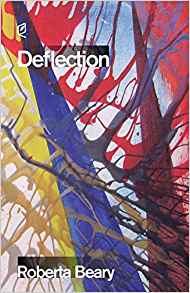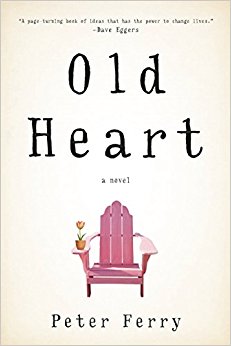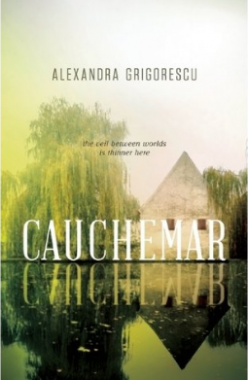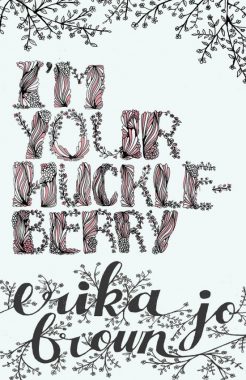Let me begin by stating how difficult it is to physically “WOW” a cohort of poets. Typically, if we see something we like we offer our praise in the form of “this is an extremely successful poem” or “neat, these images are working really well.” This was not the case with Erika Jo Brown’s collection, I’m Your Huckleberry (Brooklyn Arts Press). With every refreshing line, Brown reminds us of the elasticity of language and the true, giddy, joy of poetry.
My professor introduced this collection to my four-piece cohort over the summer. We read the opening poem, “Captain Snugz Rides Again Again” and were instantly overcome with delight. Some of us, myself included, even let out a squeal. I’m Your Huckleberry is one of those collections that makes you rethink the parameters of poetry, and then quickly reminds you that, duh, there aren’t any! In a style familiar to modern female greats such as Elizabeth Bishop, Dorothy Parker, and Edna St. Vincent Millay, Brown takes the stencil of old forms and fills it in with her own colors, often reminiscent of the more free-associative L.A.N.G.U.A.G.E poets. What readers end up with is a book of love poems that says “yeah, it’s the 21st century, and yeah, it is entirely possible to intelligently write happy poetry.”
The title of the collection in and of itself reflects both the pastiche and panache of what’s to come.. The phrase “I’m Your huckleberry” is taken from 19th century slang and it means “just the right one.” Right off the bat I’m comforted not only by the kitsch of the title, but also by the fact that it’s slang, language not often used in poetry. And, this collection is chock-full of surprisingly accessible language that somehow manages to balance both quirk and sincerity. In a bout of complete awareness Brown aptly states “Language is a skin we exchange sonically. / Hives develop with a warmth around the nape” in her poem “Skins” (1-2). These lines completely convey how it feels to read this collection – contagious, inspiring, and consuming.
The poems continue with a youthfulness that reminds me of the times I talk to pre-teens about their crushes, or something at school and then they suddenly say something that makes me realize they’re way wiser than I am. The aforementioned “Captian Snugz Rides Again Again” is a perfect example. The imperatives “Eat a schnitzel with capers./ Stop taking orders. Adopt a schnauzer” are ultimately whimsical (6-7). However, the poem progresses to “I love you more every day, not less / and this concerns me” (11-12). The sincerity of those lines exudes the empathy and passion of the speaker, and further affirms the strength of this opener.
Both the forceful imperative language paired with colloquial dissociatives continues on in poems such as “French New Wave Cinema.” The speaker asserts “Because I don’t care for Godard, / I am the loneliest poet. Go, / dart, to the heart of my beloved” (1-3). In rhythm reminiscent of the beats, Brown tears down expectations once again by smartly asserting her own awareness that this is not a pretentious collection. Godard, she seems to communicate, has no place in everyday love. The speaker also admits “Although I’m rather cerebral, / I don’t know shit about / beer” (22-24). The renunciations of these typical affectations are extremely refreshing in their meta-ness. With this poem, Brown is aware of her audience and the fact that many who appreciate poetry often put on airs. This poem, and the collection as a whole with all of its imperatives, seems to express a love of poetry for the sake of poetry. If this didact is taken to heart, sounding “smart” at the coffee shop will surely follow.
While this is a happy collection of love poems, that isn’t at all to say that they do not convey any complicated emotions. In the poem “Faeries” the opening stanza reads “We have named the names but still / our capacity for desire and / sorrow is like a grand hotel” (1-3). With masterful line breaks, Brown tempers the emotional aspects of these lines, feeding the most heart wrenching of them lastly. The poem continues similarly as it juxtaposes images typically seen as lush or whimsical, with a more aggressive overall visual:
This day was like cigarette ash
on the porch of a wild friend
whom in dreams you seize
and forcefeed sparkle cake. (4-7)
In its entirety, I’m Your Huckleberry is the kind of collection poets would tell their non-poet friends about, and vice versa. It’s about love, and while readers are left without knowing whom exactly loves whom, it’s pretty evident that Brown most loved writing this collection. In the prose poem “Depressive Narcissism, or the Case of the Lyrical I, or Capers are for Bagels, or Witness” Brown writes:
Some mornings I’d like to get a witness, not because I think I’m
deserving of some type of eternal reward, but rather because
I’m like, damn, these bananas, look how yellow, what are we
supposed to do, and why could I open the curtains yesterday
but today it’s differnt? (1-5)
These lines so intelligently sum up, to me, what it means to love poetry. It is incredible to see something as beautiful as wildly yellow bananas, but heartbreaking to not be able to share that with anyone else. Erika Jo Brown breaks away that heartbreak in this collection as she reminds readers what it means to love with more aplomb than I’ve seen in a long time.




